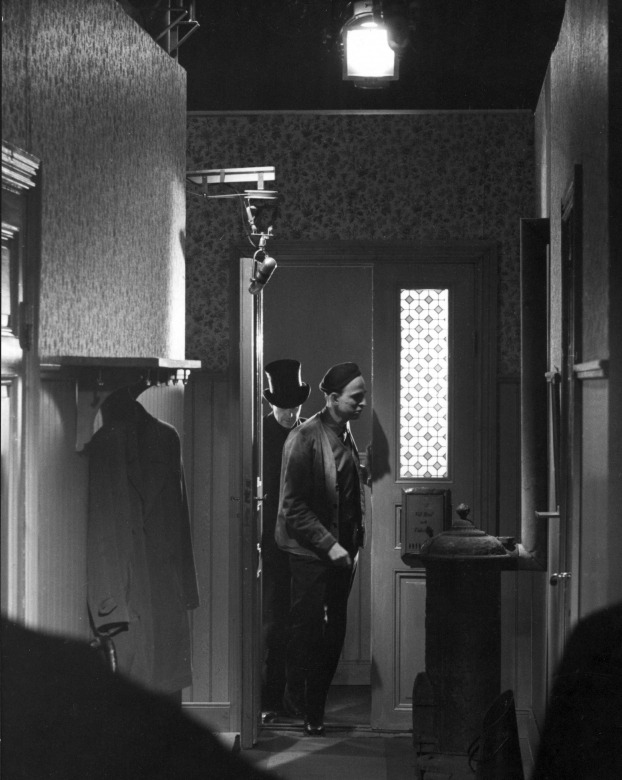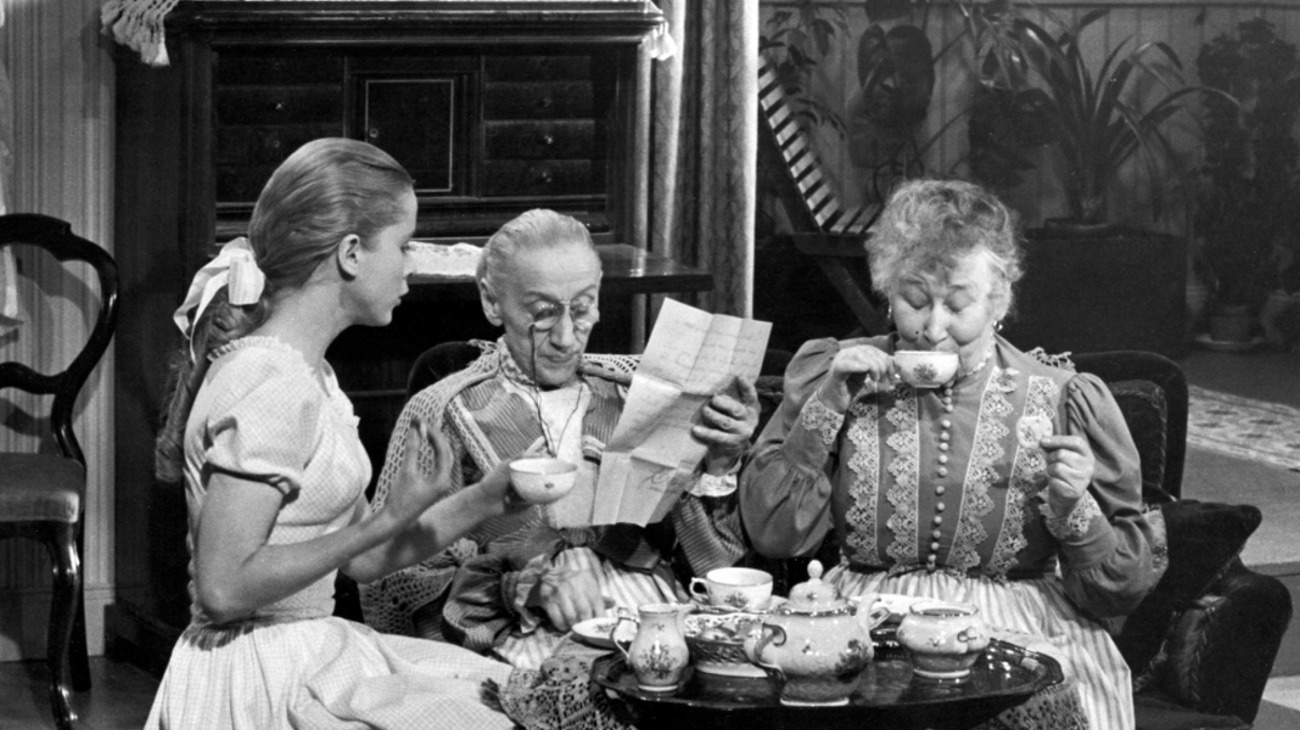
Ingmar Bergman's televised theater, part I
Ingmar Bergman was best-known in most of the world as a film director and writer; in his native Sweden, he was as well-known, if not better, as a theater director. He mostly kept these worlds separate: a few of his films have a distinctly theatrical sensibility, and at least one of his theatrical productions was about filmmaking, but he very rarely adapted theatrical works directly for the screen. The exception is a handful of television films he made across his career, starting right around the time of his major international breakthrough with The Seventh Seal and Wild Strawberries, and ending after the end of his self-described farewell to cinema, Fanny and Alexander. These were plays staged for the camera, not filmed theatrical productions; they range from one fairly major entry in Bergman's canon, a 1975 version of the Mozart opera The Magic Flute down to trivial curiosities.
The earliest of these, an adaptation of Hjalmar Bergman's (no relation) 1917 one-act play Mr. Sleeman Is Coming, is mostly a trivial curiosity, I think it's fair to say. The play was, apparently, one of H. Bergman's most persistently popular works, and it's not hard to see why: it presents an insoluble situation with some fair degree of rueful humor, and ends with a surprisingly devastating bit of ambivalence, given how little time it has had to set up the situation (I. Bergman's film runs to 43 minutes, including credits). Bina (Naima Wifstrand) and Mina (Julian Kindahl), a pair of old ladies of some means and refinement, start by informing their niece Anne-Marie (Bibi Andersson), that Mr. Sleeman (Yngve Nordwall) will be arriving that evening at 8:00. Specifically, he is coming to formally ask for her hand in marriage, recognising a long relationship between him and the family. Very long; Mr. Sleeman is older than Anne-Marie's late mother, and for other reasons besides is an extremely unappealing choice of husband for a young woman. However, the aunts, particularly the very strong-willed Bina, make it clear to Anne-Marie that she will be accepting Mr. Sleeman's offer. Unbeknownst to them, Anne-Marie has a lover in the form of a strapping young hunter (Max von Sydow) around her own age, and when he arrives that afternoon, she must bring herself to tell him about the terrible misfortune lying in wait for her. Meanwhile, the film keeps returning to the clock in the parlor, watching with sober dread as 8:00 draws closer.
That scenario plays out in two long scenes and two very short ones, a variety that already helps to keep it from feeling too stagey. Beyond this, Bergman and whatever unnamed individuals shot and edited the film rely extensively on a judicious use of shot scale, moving steadily from wide shots in the beginning to more and more close-ups as the story unfolds; in particular, once Anne-Marie realises the fate in store for her, and Bergman dives forward immediately both to flag that realisation for us, and to let us see the wait of sorrow and depression sink into Andersson's young face. The film then ends with a series of shots dissolving into each other, blurring the relationships between the characters; it creates a sense of Anne-Marie's personality being destroyed by her aunts and Mr. Sleeman.
So definitely not just canned theater, despite literally being canned theater; it is a fully cinematic work and not even an unambitious one (Bergman had been experimenting with close-ups in several of his features to this point, but I don't think any of them uses the technique so extensively as Mr. Sleeman; certainly not as a proportion of the total number of shots). The play is quite expansive given its slight length and small cast, including a biting kind of comic tone with the aunts, yearning romance between Anne-Marie and the hunter, and finally a kick of real tragedy, and for the most part, the cast handles the demands of the play perfectly well. Wifstrand (who appeared in several Bergman films before and after this, most memorably as the imposing Madame Armfeldt in Smiles of a Summer Night) is especially good, playing Aunt Bina as a merciless calculator and unyielding authority who nevertheless thinks of herself as a warm, doting caregiver; Kindahl is going a bit broader as the more agreeable and thus more manipulable of the aunts, an enthusiastic yes-woman to Bina's declarations; it's not a complicated part, and Kindahl doesn't try to complicate it. Andersson is very inconsistent: she's full of desperate tenderness in her scene with von Sydow, making the character feel over-the-top in a way that's true to the experience of being young and in love for the first time. And she's haunting in the final scene, as she empties herself out in a flush of hopeless depression. But I don't get the sense that she's figured out the first scene at all: she goes much bigger than Wifstrand and Kindahl, and if that's meant to draw a distinction between Anne-Marie and her aunts, it doesn't play that way. It plays like she's decided that gyrating and over-reading lines are a good way to seem "girlish", instead of vaguely inhuman.
Still, she recovers and then some, and the play ends on its best moments - always a good way to go out. Mr. Sleeman Is Coming is a footnote in both Bergman's theatrical and cinematic careers, but a well-made footnote and, on its own modest terms, quite enjoyable and moving. No masterpiece, but they don't all need to be masterpieces.
The earliest of these, an adaptation of Hjalmar Bergman's (no relation) 1917 one-act play Mr. Sleeman Is Coming, is mostly a trivial curiosity, I think it's fair to say. The play was, apparently, one of H. Bergman's most persistently popular works, and it's not hard to see why: it presents an insoluble situation with some fair degree of rueful humor, and ends with a surprisingly devastating bit of ambivalence, given how little time it has had to set up the situation (I. Bergman's film runs to 43 minutes, including credits). Bina (Naima Wifstrand) and Mina (Julian Kindahl), a pair of old ladies of some means and refinement, start by informing their niece Anne-Marie (Bibi Andersson), that Mr. Sleeman (Yngve Nordwall) will be arriving that evening at 8:00. Specifically, he is coming to formally ask for her hand in marriage, recognising a long relationship between him and the family. Very long; Mr. Sleeman is older than Anne-Marie's late mother, and for other reasons besides is an extremely unappealing choice of husband for a young woman. However, the aunts, particularly the very strong-willed Bina, make it clear to Anne-Marie that she will be accepting Mr. Sleeman's offer. Unbeknownst to them, Anne-Marie has a lover in the form of a strapping young hunter (Max von Sydow) around her own age, and when he arrives that afternoon, she must bring herself to tell him about the terrible misfortune lying in wait for her. Meanwhile, the film keeps returning to the clock in the parlor, watching with sober dread as 8:00 draws closer.
That scenario plays out in two long scenes and two very short ones, a variety that already helps to keep it from feeling too stagey. Beyond this, Bergman and whatever unnamed individuals shot and edited the film rely extensively on a judicious use of shot scale, moving steadily from wide shots in the beginning to more and more close-ups as the story unfolds; in particular, once Anne-Marie realises the fate in store for her, and Bergman dives forward immediately both to flag that realisation for us, and to let us see the wait of sorrow and depression sink into Andersson's young face. The film then ends with a series of shots dissolving into each other, blurring the relationships between the characters; it creates a sense of Anne-Marie's personality being destroyed by her aunts and Mr. Sleeman.
So definitely not just canned theater, despite literally being canned theater; it is a fully cinematic work and not even an unambitious one (Bergman had been experimenting with close-ups in several of his features to this point, but I don't think any of them uses the technique so extensively as Mr. Sleeman; certainly not as a proportion of the total number of shots). The play is quite expansive given its slight length and small cast, including a biting kind of comic tone with the aunts, yearning romance between Anne-Marie and the hunter, and finally a kick of real tragedy, and for the most part, the cast handles the demands of the play perfectly well. Wifstrand (who appeared in several Bergman films before and after this, most memorably as the imposing Madame Armfeldt in Smiles of a Summer Night) is especially good, playing Aunt Bina as a merciless calculator and unyielding authority who nevertheless thinks of herself as a warm, doting caregiver; Kindahl is going a bit broader as the more agreeable and thus more manipulable of the aunts, an enthusiastic yes-woman to Bina's declarations; it's not a complicated part, and Kindahl doesn't try to complicate it. Andersson is very inconsistent: she's full of desperate tenderness in her scene with von Sydow, making the character feel over-the-top in a way that's true to the experience of being young and in love for the first time. And she's haunting in the final scene, as she empties herself out in a flush of hopeless depression. But I don't get the sense that she's figured out the first scene at all: she goes much bigger than Wifstrand and Kindahl, and if that's meant to draw a distinction between Anne-Marie and her aunts, it doesn't play that way. It plays like she's decided that gyrating and over-reading lines are a good way to seem "girlish", instead of vaguely inhuman.
Still, she recovers and then some, and the play ends on its best moments - always a good way to go out. Mr. Sleeman Is Coming is a footnote in both Bergman's theatrical and cinematic careers, but a well-made footnote and, on its own modest terms, quite enjoyable and moving. No masterpiece, but they don't all need to be masterpieces.
Categories: domestic dramas, ingmar bergman, television, theatre






